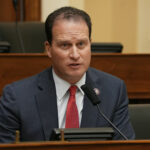‘Keep Kent Thiry happy’: Prosecutors air statements of alleged DaVita conspiracy in court

With a jury trial scheduled to take place in just over a month, the U.S. Department of Justice revealed in federal court on Thursday a catalogue of statements from co-conspirators in the alleged scheme by Denver-based DaVita, Inc. and its ex-leader, Kent Thiry, to unlawfully restrict the movement of employees between companies.
Thiry and DaVita stand accused of entering into agreements with competitors to not solicit each other’s senior employees, and to force covered workers to notify their employer if they were attempting to leave. The Justice Department alleged the non-solicitation agreements amounted to an illegal conspiracy to suppress competition under a century-old antitrust law.
Although the government’s indictment revealed limited information about the other parties involved in the alleged scheme, Special Agent Laura Timens read through email and text communications on the witness stand to illustrate the extent of the alleged conspiracy.
“You also have my commitment we discussed that I’m going to make sure everyone on my team knows to steer clear of everyone at DaVita,” Josh Golomb, the chief executive officer of Hazel Health in California, wrote to Thiry, according to documents Timens read. Golomb and Hazel Health were referenced in the indictment as “Individual 3” and “Company B.”
Timens, who works for the Federal Bureau of Investigation, testified that she has been involved with the case since December. She walked through Golomb’s attempts to appease Thiry after Golomb had spoken with a DaVita employee about a possible position.
“Did not sleep much last night knowing how much everything hurt you personally. In retrospect, should have followed my instinct and talked to you much earlier and made sure we were aligned on the right way to do things,” Timens read from Golomb’s message.
Thiry responded that the two men’s friendship would survive. “Other people at DaVita will not be as understanding, however.”
Last month, DaVita and Thiry lost their attempt to have U.S. District Court Senior Judge R. Brooke Jackson dismiss the criminal charges against them. Although Jackson acknowledged the government was pursuing a novel case involving non-solicitation agreements, “as violators use new methods to suppress competition by allocating the market or fixing prices, these new methods will have to be prosecuted for a first time,” the judge wrote.
Thursday’s proceedings in Jackson’s courtroom were a “James hearing,” which the defense requested to establish whether co-conspirator statements made out of court would be admissible as evidence. The defendants noted that the government has produced 1.7 million documents for the three criminal counts alleged.
A three-week jury trial is scheduled to begin on March 28, and the parties confirmed to the judge that there is no imminent resolution to the case through a plea deal or otherwise. Jackson fretted that, given his own full calendar and the numerous disputes over the case – including the approximately 160 statements that were the subject of the James hearing – the work of preparing for trial would be enormous.
“Look at this courtroom, folks. What do you see? You see teams and teams of lawyers,” Jackson said. “Now look at our side. What do you see? One judge and two law clerks.”
He advised the defense that it is not realistic for them to object to all of the 160 statements at issue, and told both parties to push for accurate jury instructions to avoid a higher court’s reversal on appeal.
In order to establish the existence of an unlawful conspiracy, the government will need to prove at trial that the defendants entered into the non-solicitation agreements for the purpose of allocating the market for employees and executives. Under questioning, attorneys representing DaVita and Thiry got Timens to concede that no co-conspirators ever stated that “allocating the market” was their goal.
“In my experience, it’s not necessarily common for regular people to use such language,” Timens said.
“Has any witness ever stated that the goal of that non-solicitation agreement was to keep DaVita employees at DaVita?” asked John Walsh, a former U.S. Attorney for Colorado who is now working for the defense. Timens responded that she did not know.
Attorneys for the defense also pointed out that workers did, in fact, move between DaVita and the competitors that were part of the alleged non-solicitation agreements.
Timens reviewed several interactions between DaVita employees, their counterparts in other companies, and recruiters about how to adhere to the non-solicitation agreements and avoid soliciting covered workers. She testified about her interpretation of the “ground rules” that another DaVita competitor, Radiology Partners, and its leader, Rich Whitney, communicated to Thiry.
“Radiology Partners wouldn’t proactively solicit DaVita employees and for DaVita employees who contacted Radiology Partners, they would encourage them to consider opportunities internal to DaVita,” Timens said. She added that Whitney and Radiology Partners would not pursue DaVita workers “unless they represent that they are looking for other opportunities or they have had a specific conversation with their supervisor.”
After Radiology Partners recruited a DaVita worker, Thiry sent an email saying he was “thinking about disinviting Tom” from a social event, in reference to Radiology Partners’ executive, Tom Usilton.
“This is one of a few examples we see across the conspiracy where one potential ramification of violating these agreements was exclusion from social circles or events,” Timens explained.
Golomb, the CEO of Hazel Health, texted Thiry apologetically about his interaction with a DaVita employee, adding via email that he had encouraged the employee to explore his options at DaVita and that Golomb made sure “not to offer him a title, let alone a better one.” Subsequently, Golomb wrote to another party that he was “committing to Kent a bunch of stuff for the future I don’t need to do, but out of respect given how upset he was.”
The agreement between Hazel Health, from Golomb’s point of view, “was to keep Kent Thiry happy,” Timens said.
She added that multiple individuals were cooperating with the investigation, including at least one executive at DaVita.
According to the indictment, each of the conspiracy charges could carry up to 10 years in prison for Thiry, and up to $100 million in fines for DaVita. The parties are scheduled to appear before Jackson again on March 3.
The case is United States v. DaVita Inc. et al.














